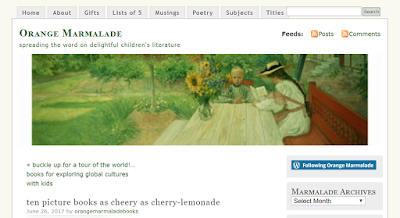If you are a parent looking for children's book recommendations -- or even just interested for yourself, I cannot recommend it highly enough. Jill has a real heart and love for children's literature and it shines through in all of her posts. Her focus is on picture books through middle grade and she covers a very wide range of titles -- from classics and Caldecotts to brand new releases, books newly translated into English, poetry and art, the occasional graphic novel, and much, much more. She values kindness and compassion, opening our minds and exploring our world, building bridges and nurturing empathy, getting outside and using our imagination.
Her posts have gently nudged me to expand my reading comfort zone and dive into poetry books and art books and all sorts of other books I might not have picked up before. Largely because of this blog, I visit the children's section of my library not just for my son, but also for myself. I never really stopped reading YA books, but I had almost completely stopped reading picture books and middle grade until I had my son. I now may have read more books Jill has recommended in these past few months than I have from any other single blog I follow. Sure, the brevity of most kidlit makes this much less of a time commitment, but the variety and quality of her book recommendations just continue to pull me in time and time again.
Her archives go back to 2010 and are a veritable treasure trove. She has a very helpful subject index as well as a title index. Realistically, I probably won't read though all those posts, but any time I search for something -- by topic, or book type, or title, something good always seems to come up. The most dangerous thing I can do is take a peek at the site to check on something before finalizing a Book Outlet order -- all of a sudden a bunch more books have landed in my cart!
But enough waxing poetic! I thought I'd share some of my favorite posts to give you a little taste of Orange Marmalade and see why exactly I love it so much. I also asked Jill to share some of her own favorite posts and she graciously agreed. Since I've only delved into the archives sporadically, her picks take us a bit further back than I've been able to explore. I hope some of these posts pique your interest, and apologies (sort of) in advance if I send you down a bit of a kidlit rabbit hole :)
First some of her "Musings" posts -- these aren't recommendation posts, but I think they paint a picture of where Jill is coming from, why she values children's books, and why she's created an entire blog dedicated to them:
* In a World of Sorrow, Shall I Dish Up Green Eggs and Ham?
* Reading as An Act of Listening
* On Never Outgrowing Picture Books
* Art Helps Us See Differently
* Books are for Wonder and Wondering
* Reading Beyond Baked Chicken
Best-of lists for the past two years:
* Orange Marmalade’s Juicy Book Awards 2015
* Orange Marmalade’s Juicy Book Awards 2016
Some of Jill's favorite posts:
* Sowing seeds of peace and refuge…some thoughts and book lists
* Turning over a new leaf?…a list of five books encouraging fresh paths for the new year
* The last homely house…a list of five brilliant books about building houses
* Flashlights and moon jumping…five books aglow with darkness
* Cold hands, warm hearts…five icy tales warm with love
* There’s a summer place…five nostalgic pieces of summer
Some of my favorite posts (so far). I have not read all the books, but I just love the variety of subjects covered. I tried to pare this list down, I really did, but it's still long :)
* Compassion ought not be political: read about refugees (Also featured here.)
* They also wrote a kids’ book…a list to celebrate my daughter’s graduation
* Words that dazzle, sizzle, nuzzle, puzzle…April is National Poetry Month!
* Tantalizing, electrifying, art history and appreciation
* Quiet wonderings, wild imaginings…five for kindling curiosity
* Mothers of the world…we salute thee!
* Can we do it? yes, we can!…books for Women’s History Month
* Each little flower, each tiny bird…books to inspire delight and care for the Earth
* Need a smile?…five books with miles of smiles
* Ancient stories for modern children
* Five quick peeks at artful alphabets
* Quietest and most constant friends…five books about books
* What the world needs now is love, sweet love…five full of love for Valentine’s Day
Lastly, I'm very much looking forward to her upcoming series for the summer -- come follow along with me!
* Buckle Up for a Tour of the World!…Books for Exploring Global Cultures with Kids
